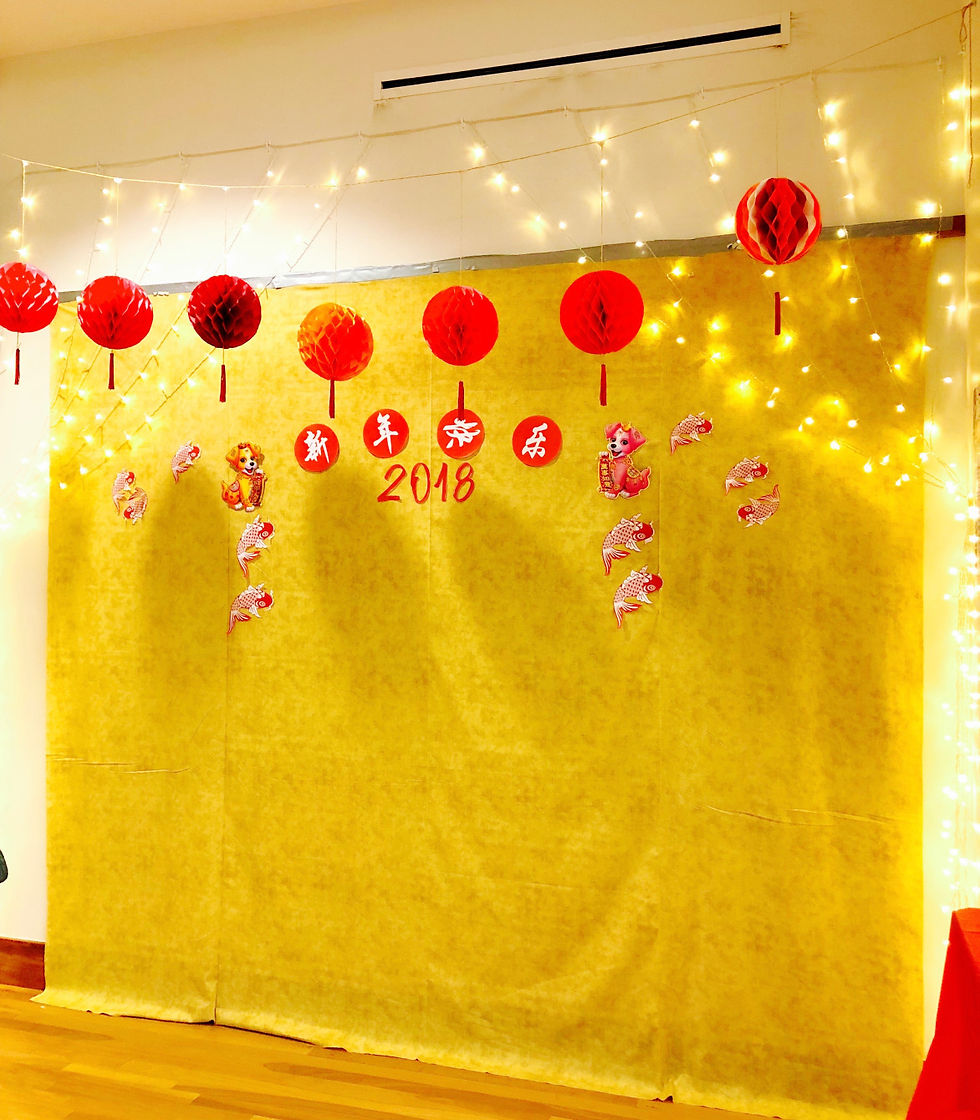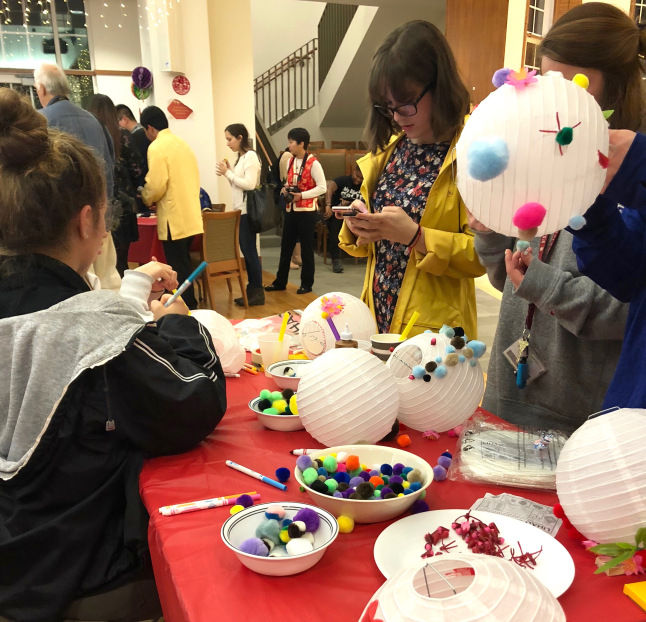Celebrating Lunar New Year at Elon University, a home away from home
- lblomquist
- Jan 24, 2018
- 5 min read
By Lilly Blomquist

For Elon University students who identify as Asian or Pacific Islander, Lunar New Year signifies a celebration of family, unity and togetherness while spending the beginning of a new season of spring and a new year of good fortune with loved ones.
“It’s good to have things that you do with your family,” said junior Angelina Lu, the vice president of Asian-Pacific Student Association at Elon. “It gives you a reason to bond with them. Your siblings are the only people present during your entire life. You have someone who knows what you’re going through from the day you are born.”
Because students will be attending classes during the official celebration Feb. 16, APSA and the Truitt Center for Religious and Spiritual Life co-sponsored Lunar New Year Wednesday, Feb. 7 at 6 p.m. in the McBride Gathering Space of the Numen Lumen Pavilion to give APSA members the opportunity to celebrate with one another and share their cultural traditions with the Elon community.

To Xiaolin Duan, the faculty supervisor of APSA, Elon provided a platform for these members to celebrate the most important festival in their culture. This Elon event facilitated a sense of cohesion and welcoming for these students, despite the absence of their blood-related family members, Duan said.
“It’s kind of lonely if you are away from your family celebrating Lunar New Year, so if the students have certain events they can go to, they feel comforted,” Duan said.
At Elon’s Lunar New Year celebration, APSA members planned an evening full of lantern-decorating contests, chopstick competitions, calligraphy lessons, traditional Chinese singing and dancing performances and authentic food of spring rolls, dumplings, noodles, sesame chicken and fried rice from the local Asian restaurant Golden Dragon Asian Bistro.
Recalling previous traditions
Since APSA members were given an outlet to organize and coordinate the event themselves, these students said they planned these activities based on their own traditional celebrations at home.
Although Lu was born in the United States, her father is from China while her mother is from Taiwan. Her Lunar New Year is spent sharing homemade Asian cuisine of fish, pigs’ feet, dumplings and tangerines with her extended family. To Lu, this family gathering establishes a stronger physical and emotional bond with her loved ones.
For senior Barang Phuk, who is an international student from Cambodia and is the co-president of APSA, her celebrations are typically spent cooking, eating and watching fireworks with her family and then praying to her ancestors for good luck during the new year.
Both Lu and Phuk incorporated their tradition of sharing meals into the Lunar New Year event at Elon so that students could experience the benefits of eating authentic Asian cuisine together and could amplify their knowledge on the culture.
Sophomore Abi Mathews, an intern at the Truitt Center who helped arrange Lunar New Year, said when APSA students organized the events’ activities based on their traditional experiences, the celebration at Elon became more personal, authentic and community-centric.
“A lot of the students who are planning it are from different Asian backgrounds, but they’re all bringing something to the table,” Mathews said.
Revisiting Lunar New Year at Elon
Celebrating this festival on a college campus clarified the purpose of APSA members’ festivities at home and redefined the meaning of unity, helping them form a deeper relationship with the Lunar New Year celebration, these students said.
For Duan, celebrating Lunar New Year at Elon was a better way to comprehend the celebration’s values of togetherness and unity than her traditional practices at home.
“When I was in China, I just stayed with my family, and we watched TV together and made dumplings, but this is more community-based,” Duan said.

Program Assistant at the Truitt Center Jan Register said the celebration helped APSA students feel connected to the Elon student body since students from various backgrounds participated in this cultural event.
“Lunar New Year is a fun, educational way to learn about an important worldview and to strengthen relationships among students who might not otherwise have a chance to interact,” Register said.
With support from about 150 to 200 event attendees, APSA members said their hard work and preparation for Lunar New Year was rewarding.
Lu said being able to embrace her Asian identity at this event taught her about the importance of community and friendship, which made planning Lunar New Year more meaningful.
“I see some of my friends that I don’t get to see in a while, and they get to know me in a more Asian context,” Lu said. “They get to see me wearing my traditional dress.”
Mathews said APSA members’ enthusiasm for their culture and their excitement expressing their identities were the reasons many students attended the event and reacted positively.
“I think it was really interesting for me to see such a minority community at Elon be so happy to have that space to celebrate something that was so meaningful to them and share that with the rest of campus,” Mathews said.
Inspiring cultural awareness
After planning this event and sharing authentic Lunar New Year traditions, APSA students said investing in the event was worthwhile since other students learned about and enjoyed a different culture.

Scott Echols, a senior and the treasurer of APSA who decided to join the organization to expand his knowledge on Asian traditions, said this learning opportunity sparked the event attendees’ interest in championing diversity on campus.
“They came to learn more about cultures they don’t know about or don’t have much experience with,” Echols said.
In line with the Chinese lunisolar calendar, the Year of the Dog begins with the first new moon and lasts 15 days until a full moon arrives. Throughout the celebration, families who celebrate Lunar New Year clean their homes to welcome a fresh start, set off firecrackers to frighten evil spirits, write messages on scrolls to receive good luck and end the celebration with the Lantern Festival.

Since APSA aims to provide a place for its members to seek comfort and expand their cultural awareness while giving people interested in the culture an opportunity to increase their knowledge, the organization of about 10 members wanted to plan Lunar New Year to continue its mission of promoting cultural understanding and creating a more inclusive community.

After Elon’s Center for Race, Ethnicity and Diversity Education acknowledged this goal, CREDE granted APSA a Diversity Grant of $500 to fund its Lunar New Year endeavor.
According to Reiney Lin, assistant director of CREDE, undergraduate students who identify as Asian or Pacific Islander on campus comprise 4.6 percent of the student population. As a minority group on campus, these students are planning more initiatives, like Lunar New Year, to continue promoting campus-wide diversity.
Going forward, APSA will be hosting events in the spring to spread more awareness of the Asian culture and will also plan a community service opportunity next fall. Additionally, APSA members said they encourage everyone, regardless of their background, to participate in their biweekly meetings.
For more information, contact APSA’s executive board members at jmoretti3@elon.edu.



Comments